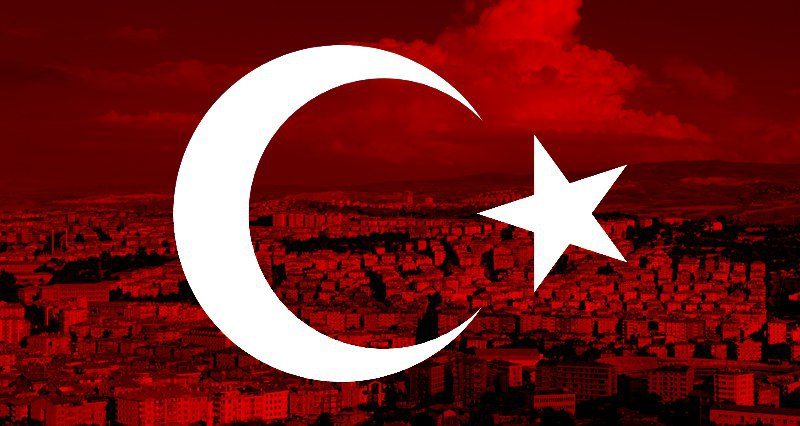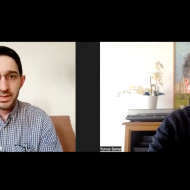LET US BEGIN WITH NATURE
2020, which started a new era for humanity in the age of industrial civilization, ended within a few weeks. 2020 will be remembered as one of the greatest lessons nature has ever taught to mankind. This lesson came because man has betrayed nature. Today’s order has come to the brink of extinction through its unbridled ambition and consumption in the framework of the neoliberal, capitalist economic model. Although the ideologues of global capitalism knew what they would do to nature, they have relentlessly encouraged excessive consumption all the same, especially over the last 50 years. At the end of the cold war, the States and the EU used their political and military power to increase their trade networks, both to increase the number of consumers and the resources to be exploited. Maps have been changed by force, governments have been overthrown. Blood, tears and destruction became the hallmarks of this period.
NATURE IS BEING DESTROYED BY THE WEST
On the other hand, as the global population increases, human beings, who are encouraged to consume excessively in accordance with the Washington Consensus, have begun to destroy nature as a result. When the growing middle class of a population of 7.8 billion met with the extreme consumption model, the human species began to not only destroy and use up resources on land, but every aspect of nature, from the oxygen they breathe to the atmosphere itself, and at record level and time. The fossil-fuel energy used by industrial civilization in electricity generation, transportation, industry and household heating has overheated the atmosphere.
The greenhouse effect created by water vapor, methane and the carbon dioxide it created increased the world average temperature from 13.5 degrees in 1860 to 14.5 degrees in 2019. The biggest part of this increase has been experienced over the last 13 years. The Arctic (The Arctic Ocean) region, which is the determinant of the balance of nature, is now witnessing the most serious indicators of this extinction. The ice cover, which acts as a kind of fuse wire of the global climate order, has shrunk by 31% since 1970. The biggest shrinkage occurred in 2007. In the Paris Agreement in 2015, an effort was made to control the global temperature increase by reducing carbon emissions. One of the goals is to achieve zero carbon emissions by switching to renewable energy for numerous countries by 2050. However, this will be very difficult to achieve. Humanity should be prepared in the 21st century for rising temperatures, rising sea levels, flooding on the coasts, droughts, forest fires, desertification, water scarcity, food crises, typhoons and hurricanes with increasing frequency and intensity.
For example, simulations have proven that a 2-meter sea level rise in the USA will cost $882 billion. Will these extremely serious warnings of nature affect human beings, and especially capitalism’s unlimited drive to win and exploit? Only time will tell. However, we can clearly see that the oil industry is shaking. In its newly published World Energy Outlook 2020 (WEO), the International Energy Agency (IEA) states that the oil industry has suffered serious losses and that there is a 25% decrease in income in countries that link their national income to oil exports. This situation reveals that international oil companies (IOC) tend to invest in renewable energy sources instead of new investments.
DEVELOPMENTS IN NATURE AND GEOPOLITICS
The main reason why I have taken so much time to discuss ecology is the fact that economic crises caused by natural events such as mass migrations, resource wars (water and agricultural areas), internal conflicts, regime changes, etc. will affect geopolitics. For instance, can we ignore the risk of establishing a puppet Kurdish state in our south with access to the sea, taking a share from Anatolia in the future? Can we say yes to developments that will lead to the loss of water basins, GAP agricultural areas, i.e., the water and food centers of our future generations?
BAD NEWS FOR GREEK CYPRIOTS
On the other hand, in our geopolitical struggle in the Eastern Mediterranean, the conjuncture presented by both COVID-19 and conditions related to global warming will lead to developments counter to the expectations of the Greek Administration of Southern Cyprus (GASC) and Greece. In an article titled Cyprus: In need of a new (energy) growth model? published in Cyprus Mail in December 2020 by energy expert Charles Ellinas at the Atlantic Center, he states that the gas to be extracted from the Aphrodite field by the Greek Cypriot Administration is insufficient for required commercial gains in terms of both quantity and price. He also added that Italian ENI and French Total companies which are important investors in the license areas of GASC would reduce their carbon emissions by 80% by 2050 and this would restrict investments, that both companies were investing in renewable energy, and, most importantly, he pointed out that cheap Russian gas was the most serious problem in the market and it was difficult to deal with. But most importantly, the article reveals the fact that the EU does not need an EastMed pipeline for the transporting of Eastern Mediterranean Gas. “With the EU adopting net-zero emissions by 2050, including a 55% cut in emissions by 2030 and implementation of the Green Deal, gas is no longer central to its future energy needs. Based on EC studies, achieving these targets means that the EU must reduce its natural gas consumption by 25-30% by 2030 and by over 80% by 2050,” he said. The article also states that the CEO of ENI cites the geopolitical imbalance in the region as the most important limiting factor.
WHAT REALLY MATTERS IN THE EAST MEDITERRANEAN IS GEOPOLITICS
Under these circumstances, I would like to return to my thesis that the main issue at hand is geopolitics, while the ecological struggle is secondary. I have emphasized this since the beginning of the Eastern Mediterranean dispute. The Eastern Mediterranean, and the Mediterranean in general, are the essential vein of 21st century Turkish geopolitics. Our isolation from this sea is unthinkable: it cannot be allowed.
However, imperialism never gives up. They want to stop the Turks from following Atatürk and reaching the sea. Even the detention and boarding of the Roseline A container (owned by a commercial institution among the world’s largest and most prestigious container companies, Arkas Holding) on November 22, 2020 without Ankara’s consent is a part of this strategy and not giving up. Germany not only damaged the principle of freedom of navigation in the high seas with its lawlessness, but also pointed a gun at Turkish citizens at sea for the first time in history.
This unlawfulness put them in such a difficult situation that even a magazine like Der Spiegel (much like the embarrassment of Turkey’s Taraf in the 2000s) had to produce artificial news following Dr. Stefan Talmon’s article. (“Like pirates” – Turkey accuses Germany of illegally boarding its merchant vessel on the high seas’’). Immediately after this article exposed some serious legal weaknesses, Germany scrambled to have their Ambassador in Ankara get on FOX TV’s morning news on December 4, 2020, with the help of their supporters in Turkey. At the same time, the leader of the main opposition party made a statement supporting the German theses. It is truly a pity. For the first time in the history of the Republic, a Turkish flagged ship was boarded without state consent.
While we should categorically reject and criticize the illegality of this action, the leader of the main opposition party went on the most watched channel in the mainstream media and was allowed to defend the German arguments. What is the difference between this situation and defending the British invasion forces’ landing in the peninsula in the Gallipoli War on April 25, 1915? It is a shame that the government increased polarization in the country instead of strengthening the national unity under the guidance of Atatürk’s realism. However, as I often remind my readers, we must stay together and follow the path laid by Mustafa Kemal Atatürk.
USING OUR GEOGRAPHY FOR OUR OWN BENEFIT
The Turkish state, the government, the opposition and the Turkish nation should be aware of the following: Our ancestors rewarded not only living generations but also future generations by choosing this geography as our homeland. Those who were aware of this geography were able to use it for strength and prosperity as they had in the 15th and 16th centuries. But geography alone does not mean anything. It must be supported by political, military, economic, technological and cultural power. The Ottoman Empire could not do this after the 17th century. They failed to have enlightenment or industrial revolutions. They lost their time in the endless vicious circles of religion in the corridors of dogma. Finally, their homeland was invaded. Without Atatürk, we would not exist. The only factor that prevented the collapse and termination of the Ottoman Empire was her unique geography that prevented the access of Russia into the Mediterranean, in line with the vision of western imperialism.
However, when it was decided to share this geography between England and Russia (Reval 1907), the Germans advanced. However, Germany lost and we were finally invaded. In 1922, the Treaty of Sèvres was ripped up. The Turkish nation was liberated by Ataturk in 1923, and became the Republic of Turkey. Then, in 1939, in the period of İnönü, an alliance with England and France, along with Atlantic dependence, was reborn, and continues to this day. The main reason is, once again, geography. So let us ask the following question: ‘Imperialism has used our geography for its own interests since the 17th century. When will we use it for ourselves?’
THE TIME IS NOW
Turkey must, from now on, conclude the period of the protection of the interests of the Atlantic system. The AKP government was encouraged and supported in 2002 by the Atlantic system to adapt its geography to the Western interests. However, on July 15, 2016, the same system pulled the trigger not only in an attempt to overthrow the government, changing the founding paradigms of the republic with the support of the West, but also to sweep Turkey from history by bogging us down in civil war. It is time to say enough. Turkey should adapt its own geopolitics, grab the compasses and draw her own, new course. For the first time in the last 350 years, we have been given this opportunity. Enough with the narrow minded village politics, with the so-called intellectuals and wardrobe Kemalists, with fake Turkish nationalism and its religious flavor determined by American indoctrination.
We live in a period in which extraordinary global and regional opportunities are arising before us. Imperialism is internally divided, a rare circumstance.
A new multipolar world order has already been established: what has happened over the last month has shown concrete indicators of this fact. The establishment of free trade zones between 15 countries with RCEP (Regional Comprehensive Economic Partnership) in Asia Pacific is one such indicator, particularly given that the five most vital and important allies of the USA in the Pacific (Japan, Australia, New Zealand, Singapore and South Korea) signed, a huge blow to the Washington Consensus. Similarly, we can now establish a direct transportation line with Azerbaijan and Central Asia through Nakhichevan for the first time in the history of the Republic, and this comes alongside the fact that Russia did not oppose the increase of Turkey’s effectiveness and fingerprints in Central Asia: Azerbaijan and the Caucasus have become the most concrete examples showcasing the transition into this new period.
Today there is a new conjuncture in spite of all the pressure and oppression of imperialism through the United States and the EU. Asia has woken up. Turkey is waking up. Turkey is learning to address the geopolitical fate of their region in West Asia. Turkey constitutes the conditions for her great meeting with the Turkish world after 1938. Ataturk’s legacy directs us toward establishing strategic and level relations with Russia within the principles of mutual interest and good neighborhood. It is producing new routes across Asia and the oceans for economic cooperation with China, the new leader of the global economy. The Turkish economy, demographic strength and defense industry cannot be compared with the conditions of 1853 and 1947 when we surrendered to the West.
We are entering a period where we will finally escape our forced marriage cycl with the West. It is not possible for us to forget that an EU nation boarded a Turkish-flag vessel on November 22, 2020, an effort to humiliate and insult us. In the words of academician and journalist Barış Doster, the EU is not a civilization project. It is a political, diplomatic and economic project. Moreover, it is not civilization’s patent office: it is an imperialist project. The United State is a young state whose written history is only 244 years old. Even our Naval Academy is 3 years older than it is. We all saw the circumstances of the US during the COVID-19 outbreak, the George Floyd riots and the presidential elections. We have been watching Washington’s “contribution” to the world order, peace and prosperity since the end of the Cold War in dismay. Our actions must be guided by these facts. We must not forget that our ancestors established an empire in these lands, and that we were the first nation to beat imperialism with the War of Independence and the Kemalist revolution. In addition, our homeland has not been liberated by anyone other than Turks throughout our history. Colonial governors did not write our constitutions. The Turkish people should be confident. We should know the value of our republic, our homeland and the Blue Homeland, which is located in the most beautiful geography on earth with excellent natural conditions. The possibility of a return to the period between 1923-1938 should no longer be a potential vision but a kinetic reality. Let me end by reminding my reader of one of the most important qualities of the Turks: If they once succeed, they will succeed again.









Leave a Reply